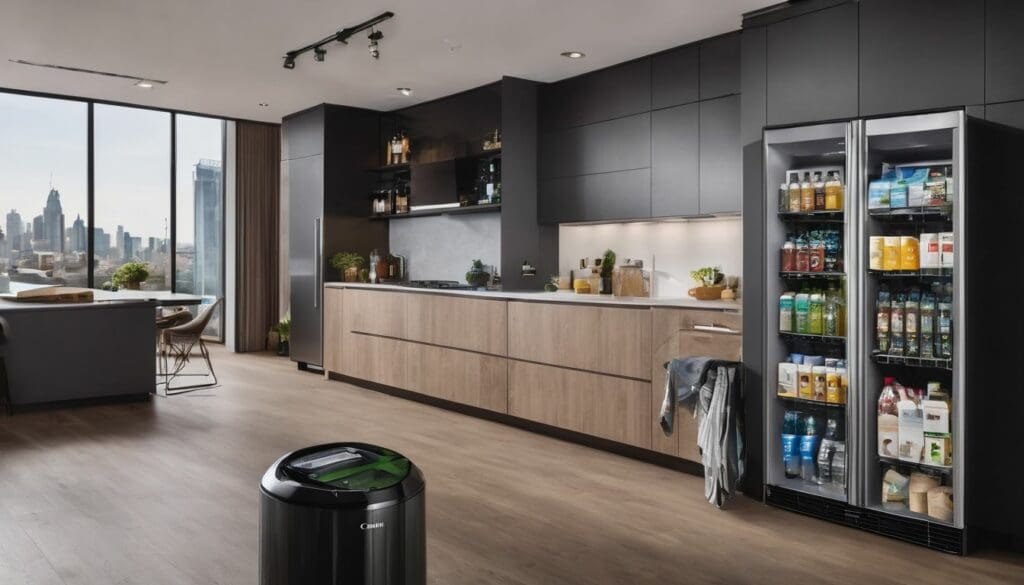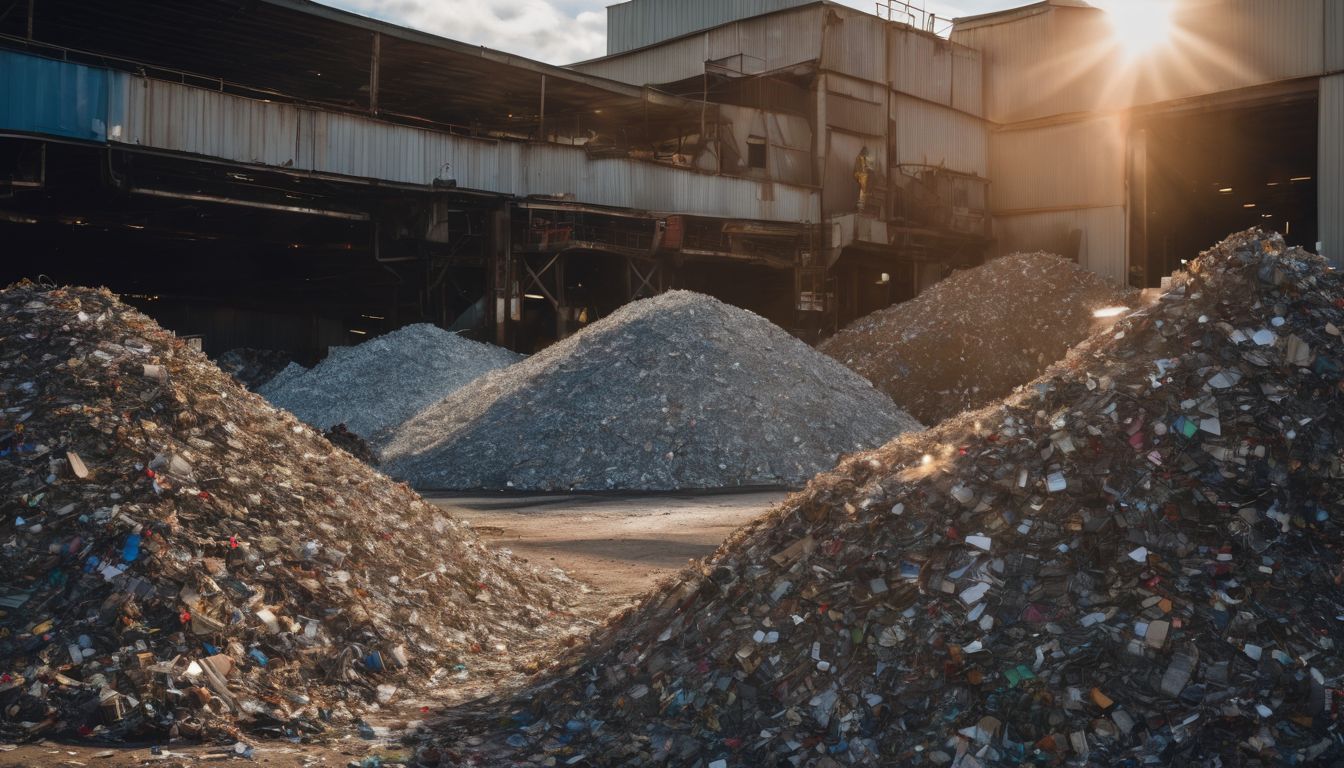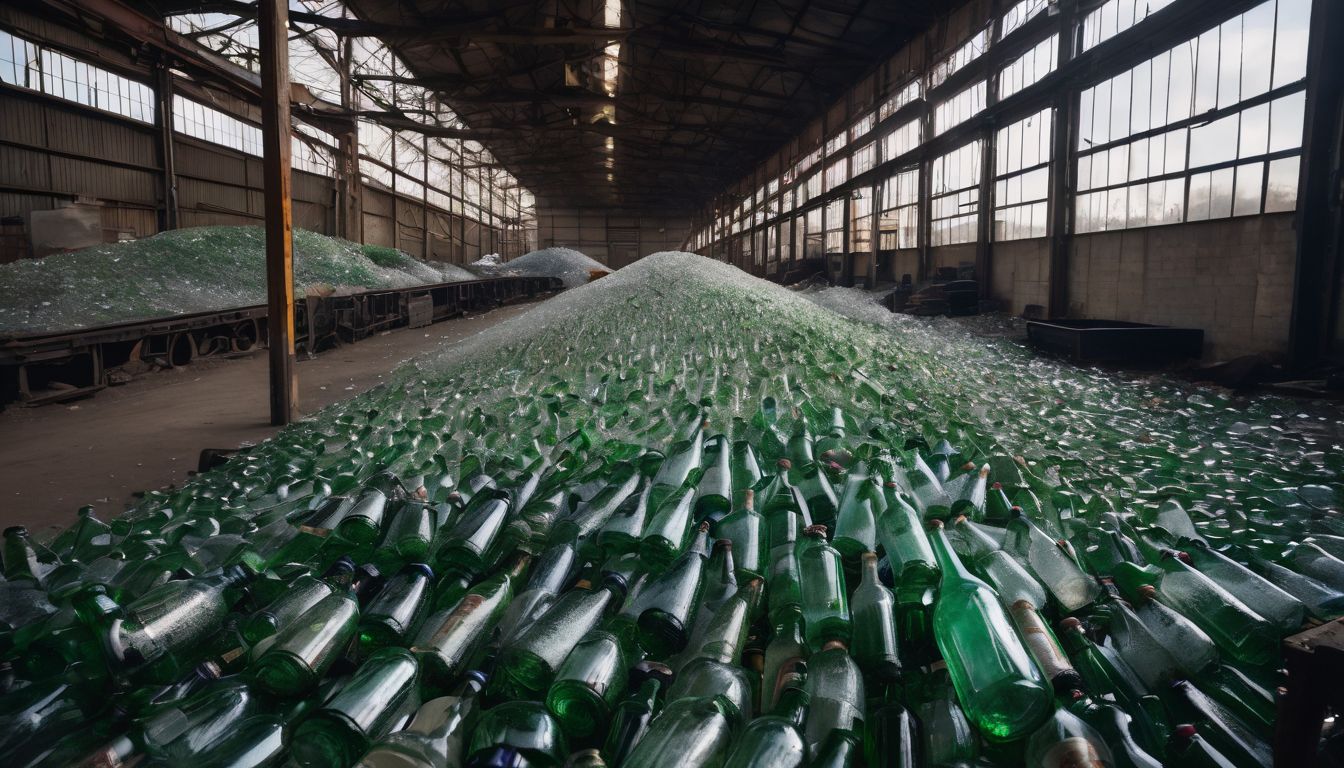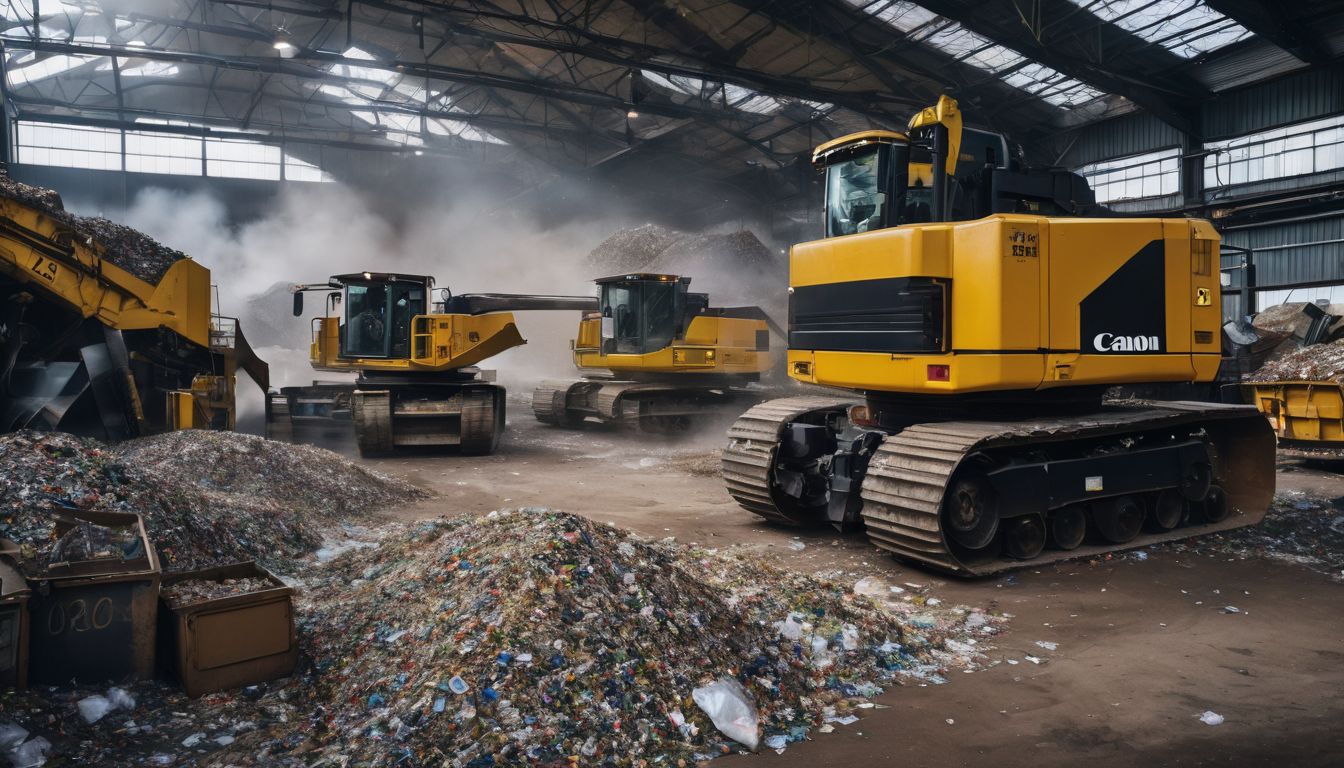Confused about what goes in the recycling bin and what doesn’t? In the UK, we recycle just over 45% of our household waste. Our comprehensive guide is here to clarify household recycling, making it easier for you to contribute effectively.
Dive in for greener living!
Key Takeaways
- In the UK, household recycling includes separating materials like paper, glass, metal, and plastic for processing into new products. Local councils provide bins and collect recyclables regularly.
- Proper recycling requires cleaning and drying containers to prevent contaminating the recycling stream. Check local council guidelines for specific instructions on what can be recycled.
- Common mistakes in recycling include putting greasy pizza boxes, plastic bags, disposable coffee cups, textiles and polystyrene in household bins when they require special handling or cannot be recycled kerbside.
- To improve home recycling efforts: reduce single-use plastics by opting for reusable items; compost organic waste; and choose sustainable packaging options where available.
- Future advancements in UK recycling are looking at transforming food and plastic packaging systems to curb waste significantly and address climate challenges.
Understanding Recycling in the UK
Recycling in the UK involves separating and collecting materials like paper, glass, metal, and plastic for processing into new products. It is an essential part of reducing waste and conserving natural resources.
How recycling works
Recycling starts with the collection of materials that can be reused. Local councils in the UK provide households with recycling bins for paper, glass, metal, and some plastics. Once filled, these bins are collected by waste management trucks on designated days.
The contents then travel to materials recycling facilities where they are sorted into different types.
At these facilities, sophisticated machinery separates items based on material type. Magnets extract metals, while blowers lift lightweight paper and cardboard from heavier objects.
Next comes a manual sorting stage to remove contaminants like food residue or non-recyclable plastics that might have slipped through. Cleaned and sorted recyclables are compacted into bales and sent off to manufacturers who transform them into new products—completing the cycle of resource conservation and reducing our need for raw materials extraction.
The importance of recycling
Understanding how recycling works leads us to recognise the crucial importance of responsible waste disposal. Recycling conserves natural resources, reduces greenhouse gas emissions, and minimises the amount of waste that ends up in landfills.
By diverting materials from landfills, we contribute to a cleaner environment and help create a more sustainable future for generations to come. Embracing the practice of recycling not only benefits our immediate surroundings but also plays a part in addressing global environmental challenges like climate change and resource depletion.
Recycling offers an effective means for individuals to play an active role in preserving the planet by reducing energy consumption, cutting down on pollution, and supporting sustainability initiatives.
What Can and Cannot Be Recycled?
Recycling guidelines in the UK are specific and understanding what can and cannot be recycled is crucial. From paper and cardboard to glass and plastic, it’s important to know which items can go into your recycling bin and which ones should be disposed of in your residual bin.
Recycling guidelines
To properly recycle in the UK, it’s important to follow these guidelines:
- Check your local council’s guidelines to understand the specific recycling rules in your area, including what can and cannot be recycled.
- Separate materials into different categories such as paper, cardboard, glass, plastics, and metals to make the recycling process more efficient.
- Clean and dry containers before recycling to avoid contamination and ensure they are in suitable condition for processing.
- Consult the A – Z of recycling to learn which materials are accepted by recycling facilities and which should be disposed of in residual bins.
- Be mindful of commonly mistaken items for recycling such as greasy pizza boxes, disposable coffee cups, and plastic bags that often contaminate recyclable materials.
- Stay updated on any changes in recycling policies and regulations to adapt your household recycling practices accordingly.
- Encourage others within your community to adhere to proper recycling guidelines through education and awareness efforts.
Types of waste that can be recycled
You can recycle the following types of waste in the UK:
- Glass: Glass bottles and jars are fully recyclable. Ensure they are rinsed and clean before recycling.
- Paper and Cardboard: Recycle newspapers, magazines, cardboard boxes, and cereal boxes. Flatten cardboard boxes before recycling.
- Plastic: Certain types of plastic like bottles, tubs, trays, and pots can be recycled. Check for the recycling symbol on the packaging.
- Metals: Aluminium and steel cans are recyclable. Rinse them out before recycling.
- Textiles: Old clothes, shoes, curtains, and bedding can be recycled at designated collection points or charity shops.
- Electrical Items: Recycle small electrical items such as toasters and kettles at recycling centres or through manufacturer take-back schemes.
- Food Waste: Compost food scraps such as fruit and vegetable peelings, tea bags, and coffee grounds to reduce household waste.
Commonly mistaken items for recycling
Many everyday items are mistakenly placed in recycling bins. Educating yourself on what can and cannot be recycled is crucial for effective recycling practices. Here are some commonly mistaken items for recycling:
- Greasy pizza boxes: Pizza boxes contaminated with grease or food residue should not be recycled as they can contaminate the entire batch of recyclables.
- Plastic bags: Although many assume plastic bags can be recycled, they usually require special processing due to their lightweight and thin nature, so they cannot go into your household recycling bin.
- Coffee cups: Disposable coffee cups often have a thin layer of plastic or wax lining to make them waterproof, which makes them non-recyclable in most kerbside programmes.
- Clothing and textiles: While clothing and textiles are indeed recyclable, they should not be placed in your regular household recycling bin as they require different processes to separate fibres and materials.
- Styrofoam: Polystyrene foam, commonly known as Styrofoam, is difficult to recycle due to its lightweight nature and the fact it can break into small pieces during transportation.
How to Recycle Properly
Ensure to separate materials such as paper, plastic, glass and metal before placing them in the recycling bin. Clean and dry containers before recycling to avoid contamination. Check your local council’s guidelines for specific instructions on proper recycling practices.
Separate materials
Once you have gathered your recyclables, separate materials into categories such as paper, plastic, glass, and metal. Keep in mind that some items may need to be further sorted according to specific recycling guidelines provided by your local council.
This step helps ensure that each type of material can be processed efficiently at the recycling facility.
Ensure your recyclables are clean and dry before sorting them into their respective categories. Rinse out food containers and remove any remaining residue to prevent contamination of other materials in the recycling stream.
Clean and dry containers
Clean and dry containers before recycling them. This prevents contamination of other recyclables and ensures they can be processed efficiently. Rinse out any food residue, let the containers air dry, and remove any lids or caps before recycling.
To ensure that your efforts are not wasted, make sure to clean and dry containers thoroughly to help maintain the quality of recycled materials. Contaminated items often end up in landfills, defeating the purpose of recycling.
Know your local council’s guidelines
Familiarise yourself with your local council’s guidelines for household recycling. Check their website or contact them directly to understand specific rules and collection schedules in your area.
Different councils may have varying guidelines on what can be recycled, how to prepare materials for collection, and which items are accepted in recycling bins.
Take the time to educate yourself about the regulations that apply to your location. Being aware of the specific guidelines set by your local council ensures that you are contributing effectively towards sustainable waste management practices while minimising contamination in recycling streams.
Tips for Improving Household Recycling
Reduce plastic use, properly dispose of food waste, and opt for sustainable packaging options to make a positive impact on the environment. For more detailed tips and information on household recycling in the UK, keep reading our complete guide!
Reduce plastic use
To reduce plastic use, start by opting for reusable alternatives such as stainless steel water bottles and cloth shopping bags. Avoid single-use plastics like straws, cutlery, and takeout containers by carrying your own environmentally friendly options when dining out.
Look for products with minimal or recyclable packaging to further minimise plastic waste.
Consider purchasing in bulk to reduce the amount of disposable plastic packaging used. Choose products with eco-friendly biodegradable or compostable packaging whenever possible. Encourage sustainable practices by supporting businesses that offer refill stations for household items like cleaning supplies and personal care products.
Properly dispose of food waste
To reduce plastic use, it’s crucial to properly dispose of food waste. Organic kitchen scraps like fruit and vegetable peels, coffee grounds, and eggshells can be composted to create nutrient-rich soil for gardening.
If you don’t have a compost bin, check if your local council offers organic waste collection services. Additionally, avoid throwing food waste in the regular trash as it contributes to greenhouse gas emissions in landfills.
Consider starting a small home compost system or supporting community initiatives for organic waste recycling. By diverting food waste from landfills and turning it into compost, you contribute to reducing methane emissions while enriching the soil with valuable nutrients.
Opt for sustainable packaging options
Choose sustainable packaging to reduce environmental impact. Look for products with minimal or recyclable packaging materials, such as glass, paper, or cardboard. By choosing sustainably packaged items, you contribute to reducing plastic waste and supporting eco-friendly practices.
Make a conscious effort to select products with biodegradable or compostable packaging options whenever possible.
Incorporating sustainable packaging into your household consumption habits is essential for promoting environmentally friendly practices and reducing our carbon footprint. This small change can have a significant positive impact on the environment and create a more sustainable future.
The Future of Recycling in the UK
The future of recycling in the UK is focused on transforming global food and plastic packaging systems to reduce waste and tackle the climate crisis. As we move forward, it’s important for households to be aware of the changes and continue adopting sustainable practices.
Transforming global food and plastic packaging systems
Global food and plastic packaging systems are undergoing transformation to reduce environmental impact. Companies are innovating sustainable packaging materials, such as biodegradable or compostable alternatives, to replace traditional plastics.
Additionally, there is a growing emphasis on reducing food waste through improved packaging design and distribution methods, ultimately contributing to a more sustainable future.
These initiatives aim to address the detrimental effects of single-use plastics on the environment while promoting responsible consumption and waste reduction. As more consumers and businesses embrace these changes, significant progress can be made in achieving more eco-friendly global food and plastic packaging systems.
Tackling the climate crisis
Tackling the climate crisis requires immediate and sustained action from every individual. Reducing carbon emissions, supporting renewable energy sources, and advocating for sustainable practices are essential steps in combating climate change.
By making conscious choices such as reducing waste, reusing materials, and responsibly disposing of items, we can collectively work towards a healthier planet.
Transforming global food and plastic packaging systems plays a significant role in mitigating environmental impact. Encouraging the use of biodegradable products and promoting eco-friendly packaging options are key strategies to address the climate crisis.
Conclusion
In conclusion, mastering household recycling is crucial for a sustainable future. Understanding the do’s and don’ts of recycling empowers individuals to make eco-friendly choices. By embracing these practices, we can all play a part in safeguarding the environment.
FAQs
1. What is The Complete Guide to Household Recycling in the UK?
The Complete Guide to Household Recycling in the UK is your go-to resource for understanding recycling guidelines, rules, and how to recycle different materials properly.
2. Why are household recycling guidelines important in the UK?
Household recycling guidelines help boost recycling rates in the UK by giving clear advice on separating and disposing of waste, which supports sustainability practices and zero-waste ambitions.
3. Can you tell me what items can and cannot be recycled according to UK policies?
Yes! Understanding what can and can’t be recycled is crucial, as it ensures that materials are sorted correctly for effective household waste recycling under current regulations.
4. Where do I find tips on improving my home’s green living through better recycling?
You’ll find plenty of tips and tricks within this ultimate guide to help enhance your home’s green living by adopting better household recycling habits as part of everyday sustainability practices.
5. Do we have a book or a detailed source about waste disposal and recycling in the UK?
Indeed! There’s “The Rubbish Book,” providing an A-Z guide for waste disposal and comprehensive information on all things related to household recycling across the nation.





